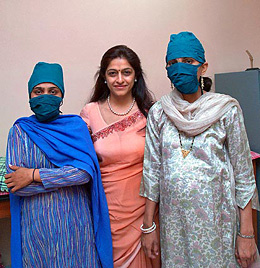The globalisation of baby-making
Ellen Goodman fears commercialism
 Surrogacy is an issue which divides feminists. Viewed through the lens of "choice", it could be seen as a positive step. Viewed through the lens of female identity, it seems regressive, as it involves turning the body into a cog in a production process. Ellen Goodman, a veteran columnist for the Boston Globe, expressed her misgivings in a column about the international baby-making market.
Surrogacy is an issue which divides feminists. Viewed through the lens of "choice", it could be seen as a positive step. Viewed through the lens of female identity, it seems regressive, as it involves turning the body into a cog in a production process. Ellen Goodman, a veteran columnist for the Boston Globe, expressed her misgivings in a column about the international baby-making market.
"Nevertheless, there is — and there should be — something uncomfortable about a free-market approach to baby-making. It’s easier to accept surrogacy when it’s a gift from one woman to another. But we rarely see a rich woman become a surrogate for a poor family. Indeed, in Third World countries, some women sign these contracts with a fingerprint because they are illiterate.
"For that matter, we have not yet had stories about the contract workers for whom pregnancy was a dangerous occupation, but we will. What obligation does a family that simply contracted for a child have to its birth mother? What control do – should – contractors have over their "employee’s" lives while incubating "their" children? What will we tell the offspring of this international trade?
"It’s the commercialism that is troubling. Some things we cannot sell no matter how good "the deal." We cannot, for example, sell ourselves into slavery. We cannot sell our children. But the surrogacy business comes perilously close to both of these. And international surrogacy tips the scales.
"So, these borders we are crossing are not just geographic ones. They are ethical ones. Today the global economy sends everyone in search of the cheaper deal as if that were the single common good. But in the biological search, humanity is sacrificed to the economy and the person becomes the product. And, step by step, we come to a stunning place in our ancient creation story. It’s called the marketplace. ~ Boston Globe, Apr 11
- How long can you put off seeing the doctor because of lockdowns? - December 3, 2021
- House of Lords debates assisted suicide—again - October 28, 2021
- Spanish government tries to restrict conscientious objection - October 28, 2021
